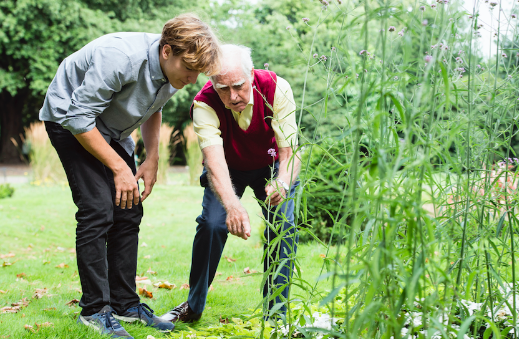We still have deeply entrenched ideas about who provides care, but male carers can provide physical strength, as well as gentility, patience, and understanding in a caregiving role.
Speak to one of our knowledgeable care advisers about Hometouch’s high quality live-in care service

Why are so few care givers male?
Everyone has the capacity to care. So why are only one in seven professional carers male?
In this country the vast majority of caregivers are women. They make up as many as 84% of professional carers across the sector, and this figure has remained static since 2012.A question of numbersIt’s time to change our prejudices. After all, we no longer assume that doctors are male and nurses are female, as a society we need to recognise that excellent care can be provided by both men and women.Additionally, our ageing population and the increased number of people with complex needs, means that there is an ever-increasing need for care. A report by the charity Independent Age predicted that there may be a shortfall of 350,000 carers in twenty-years-time.To meet this need and avoid a care crisis, we need to attract more talent into the industry, and that means recruiting men as well as women.A matter of choiceProfessor Martin Green, the chief executive of Care England has emphasised the importance of recruiting more men into front-line social care.We have an ageing population and a lot of people who receive care into old age now are men. The majority of carers are women. When it comes to personal care in particular, some men prefer this to be done by a male rather than female.Many elderly and disabled men do feel more comfortable being washed, dressed and taken to the toilet by another man. However, despite this, there is a stigma about male caregivers. We still have deeply entrenched pre-conceived ideas about who provides care. We think that women are naturally pre-disposed to care for others, but as time goes by, research is proving that both men and women are equally capable and equally likely to provide a caring role.Strength in careAt hometouch we have many male carers and they provide an excellent service, being compassionate, efficient and considerate.Without wishing to reinforce gender stereotypes, it is certainly true that male carers often have greater physical strength than their female counterparts. This difference can be incredibly useful when it comes to assisting with transfers and helping with self-care for people with poor mobility.Male carers provide a different type of companyBecause of how men are brought up, the company of men is often different to the company of women. It can be the case that male loved ones are more easily able to identify with male carers on a different level to their female counterparts, forming relationships that are based on more than just the caring role.A definite career choice
I think the problem isn’t just about preconceptions. It’s about the pay and working conditions within the industry.An idea that is backed up by a study by the Skills for Care organisation. They found that too often, men view care jobs as poorly paid, with unpleasant duties and few opportunities for promotion. This sounds unpleasant, but the positive upshot is that the men who do go into care, do so because they really want to do it. All of our carers are rigorously tested and vetted, with only 5% making it through to having their profile hosted on our site. All of our carers are passionate about their role, and that goes for the men and the women.



